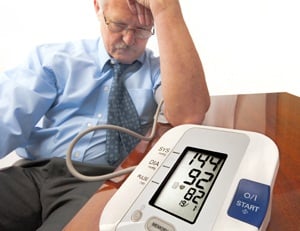
People with high blood pressure in middle age are more likely to experience cognitive decline – a common precursor of dementia – in their 70s and 80s, according to new research.
The U.S. study spanning 20 years found steeper mental decline at the end of that period among people who started out with hypertension or even slightly elevated blood pressure – so-called pre-hypertension – in their 50s and 60s.
These new results strengthen a link experts already knew about, lead author Dr. Rebecca F. Gottesman told Reuters Health. High blood pressure has been tied to an increased risk of stroke and dementia in other studies.
Read: Work stress may raise heart attack and stroke risk
"Basically the amount of decline we see associated with hypertension is pretty modest, but this amount is equivalent to being 2.7 years older at the start compared to not having it," noted Gottesman, from the neurology department at Johns Hopkins University School of Medicine in Baltimore, Maryland.
Pre-hypertension
"Even having pre-hypertension, which often isn't treated, was associated with some cognitive decline," Gottesman said.
She and her team used blood pressure and mental performance data from the early 1990s for over 13,000 adults between ages 48 and 67 years old. More than 5,000 remained alive and available for more testing between 2011 and 2013.
After the first round of mental tests and blood pressure readings in 1990-1992, the verbal, memory and math tests were administered two more times, in 1996-1998 and in 2011-2013.
Read: How exactly is the blood pressure test done?
Researchers divided the participants into three groups. Those with a reading of less than 120 millimetres of mercury (mm Hg) systolic and 80 mm Hg diastolic during the early-90s measurements were considered to have normal blood pressure.
Those with blood pressure up to 139/89 mm Hg were considered to have pre-hypertension. Anyone above that reading and those with a prescription for anti-hypertensive medication were considered to have high blood pressure.
Decline in mental performance
People with hypertension at the start were twice as likely to have died by 2011 than those without it, according to the results published in JAMA Neurology.
For those still alive, having high blood pressure at the first round of tests was associated with 6.5 percent greater decline in mental performance at the last round of tests than was seen in people with normal blood pressure.
Read: Premature menopause may cause mental decline
For people with pre-hypertension, the rate of mental decline over the same period was somewhere in between those with hypertension and those with normal blood pressure.
The differences are not huge, Gottesman said, but being the equivalent of 2.7 years older mentally means that Alzheimer's disease, if it comes, will come earlier, and for the population in general that would be an important difference, she said.
Those with high blood pressure who took medication to treat it had an intermediate level of mental decline, similar to those in the pre-hypertension group.
"People don't tend to know what their blood pressure is nor do they take it seriously because it doesn't cause symptoms," Gottesman said.
Middle age blood pressure
"Middle age may be an ideal time window to intervene on blood pressure as the brain has not yet received a long-term or chronic pounding from blood pressure elevation which can set the stage for irreversible brain changes that affect cognition," said Dr. Philip B. Gorelick of Michigan State University College of Human Medicine in Grand Rapids.
Gorelick wrote an editorial accompanying the new study.
By age 40, people should be keeping track of their blood pressure, and perhaps earlier if they have a family history of hypertension, Gottesman said – though you don't need to check your readings too often or become obsessed with it.
"At least have an idea of where you are," she said.
"Our data suggests the lower the better but we didn't have many with very low blood pressure," she said. "I think in general aiming for the healthy range below 120/80 is a good idea."
Read: Types of hypertension
People with hypertension are usually told to aim for less than 140/90 mm Hg, Gorelick told Reuters Health by email.
Jury still out
Just following a group of people for several years, as in this study, cannot prove that having high blood pressure actually causes mental decline, only that the two are associated somehow.
"The jury is still out somewhat on what the mechanisms are," Gottesman said. "Honestly probably multiple things are going on."
Some researchers believe that high blood pressure directly leads to Alzheimer's disease, while others believe high blood pressure causes "silent strokes" and other changes in the brain that raise dementia risk, she said.
Read: Eyes may reveal stroke risk
The study underscores that for people with hypertension in middle age, taking medication and controlling blood pressure levels through diet, exercise and reduced salt intake are important measures, she said.
"One would expect and hope that good cardiovascular health practices would lead to preservation of cognition," Gorelick said.
Read more:
When is blood pressure considered high?
Depression linked to faster cognitive decline in old age
Image: Senior man with high blood pressure from Shutterstock




 Publications
Publications
 Partners
Partners















